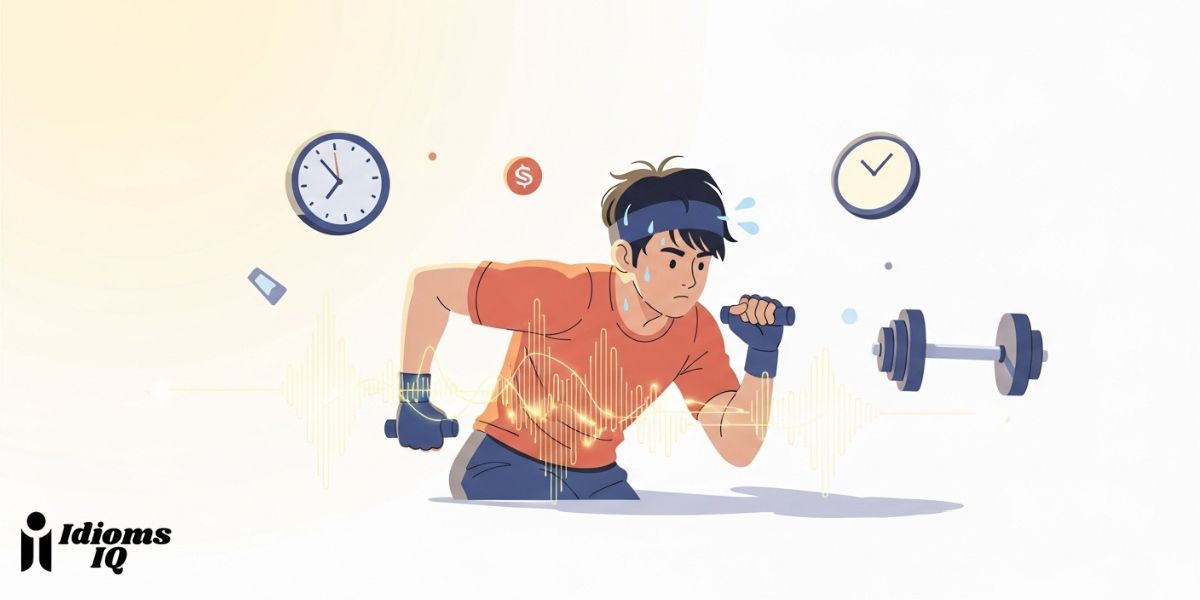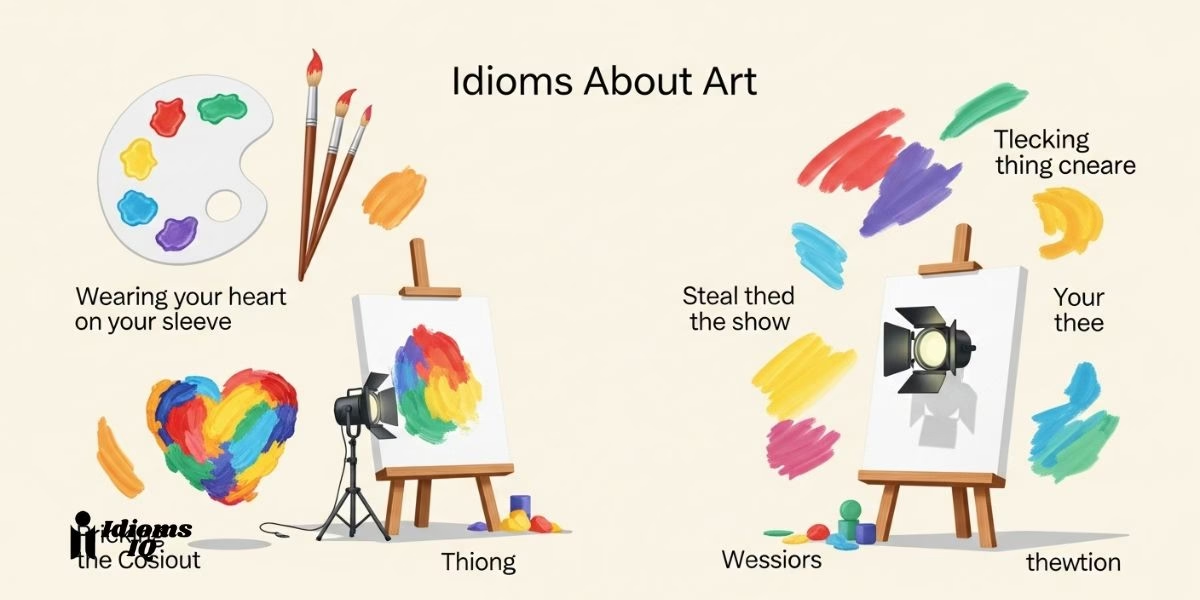
Language is a vibrant and dynamic tool, and among its most evocative figures of speech are idioms. These unique phrases, whose meanings cannot be deduced from the literal definitions of their individual words, offer a fascinating glimpse into the cultural nuances and shared experiences of a community. Idioms are more than just linguistic quirks; they are concentrated capsules of wisdom, emotion, and insight.
By understanding and using idioms, we don’t just expand our vocabulary; we deepen our comprehension of human nature and the world around us. They can transform ordinary conversations into engaging dialogues, inject humor or gravitas into our writing, and inspire deeper thinking. Embracing idioms for hard working allows us to articulate complex emotions or situations with precision and clarity, fostering a richer, more empathetic connection with others and a clearer understanding of life’s intricate tapestry, ultimately helping us in understanding life better.
f you’re looking for something more playful, check out these fun and expressive idioms involving tea
Idioms for Hard Working
Here are 35 hardworking idioms that vividly describe various aspects of dedication and effort.
1. Work one’s fingers to the bone
- Meaning: This idiom signifies working extremely hard, often to the point of exhaustion or physical strain, indicating immense dedication and effort.
- Use in a sentence: She had to work her fingers to the bone to finish the project before the tight deadline.
- Other ways to say it: Toil tirelessly, labor exhaustively, exert oneself fully.
2. Burn the midnight oil
- Meaning: This idiom means to work late into the night, often sacrificing sleep, to complete a task or study, showing intense commitment and perseverance.
- Use in a sentence: Students often burn the midnight oil before final exams to ensure they cover all the material.
- Other ways to say it: Stay up late working, pull an all-nighter, work through the night.
3. Sweat blood
- Meaning: This idiom expresses putting in an extreme amount of effort, often under great difficulty or pressure, indicating a willingness to endure hardship.
- Use in a sentence: He had to sweat blood to get the business off the ground in its early years.
- Other ways to say it: Toil arduously, strive intensely, struggle fiercely.
4. Go the extra mile
- Meaning: This idiom means to make a special additional effort beyond what is expected or required, showing dedication and a proactive attitude.
- Use in a sentence: The customer service representative always goes the extra mile to ensure client satisfaction.
- Other ways to say it: Exceed expectations, make a special effort, do more than necessary.
5. Pull one’s weight
- Meaning: This idiom refers to doing one’s fair share of work in a group or team, contributing equally and responsibly.
- Use in a sentence: Everyone needs to pull their weight if we want to complete this group project successfully.
- Other ways to say it: Do one’s part, contribute equally, carry one’s load.
6. Put one’s nose to the grindstone
- Meaning: This idiom means to work hard and diligently, focusing intently on a task without distraction, often implying a period of intense, focused effort.
- Use in a sentence: With the deadline approaching, it’s time to put our noses to the grindstone and finish this report.
- Other ways to say it: Work diligently, focus intensely, apply oneself rigorously.
7. Work like a dog
- Meaning: This idiom signifies working extremely hard, often for long hours and with great energy, implying a tireless and dedicated effort.
- Use in a sentence: He had to work like a dog all summer to save enough money for college tuition.
- Other ways to say it: Toil relentlessly, labor strenuously, exert great effort.
8. Work like a horse
- Meaning: Similar to “work like a dog,” this idiom emphasizes working with great strength, endurance, and perseverance, often for extended periods.
- Use in a sentence: The farmer works like a horse from dawn till dusk during harvest season.
- Other ways to say it: Labor tirelessly, exert oneself mightily, put in immense effort.
9. Work like a Trojan
- Meaning: This idiom means to work with exceptional strength, determination, and resilience, often overcoming significant challenges, referencing the legendary Trojans.
- Use in a sentence: The construction crew worked like Trojans to complete the building ahead of schedule.
- Other ways to say it: Labor with great might, strive with fierce determination, perform heroically.
10. Keep one’s shoulder to the wheel

- Meaning: This idiom means to continue working hard and steadily, especially during a difficult or prolonged task, showing perseverance and commitment.
- Use in a sentence: Despite the setbacks, they decided to keep their shoulder to the wheel and see the project through.
- Other ways to say it: Persevere, persist diligently, continue steadfastly.
11. Buckle down
- Meaning: This idiom means to apply oneself seriously and with determination to a task, often after a period of less intense effort, indicating a shift to focused hard work.
- Use in a sentence: If you want to pass the exam, you need to buckle down and study every night.
- Other ways to say it: Get serious, apply oneself, concentrate fully.
12. Roll up one’s sleeves
- Meaning: This idiom means to prepare for hard work or to get ready to tackle a difficult task with enthusiasm and readiness.
- Use in a sentence: There’s a lot to do, so let’s roll up our sleeves and get started.
- Other ways to say it: Prepare for work, get ready to act, brace for effort.
13. Work around the clock
- Meaning: This idiom means to work continuously for 24 hours or for very long, uninterrupted periods, often indicating extreme dedication to meet a deadline.
- Use in a sentence: The emergency response team worked around the clock to restore power after the storm.
- Other ways to say it: Work non-stop, labor continuously, put in endless hours.
14. Work flat out
- Meaning: This idiom means to work as hard and as fast as one possibly can, exerting maximum effort and energy.
- Use in a sentence: We had to work flat out for weeks to meet the production quota.
- Other ways to say it: Work at full capacity, exert maximum effort, go all out.
15. Work oneself into the ground
- Meaning: This idiom means to work so hard that one becomes completely exhausted or ill, often implying an unhealthy level of overwork.
- Use in a sentence: She was so dedicated to her startup that she almost worked herself into the ground.
- Other ways to say it: Overwork, exhaust oneself, burn out.
16. Pull out all the stops
- Meaning: This idiom means to use all available resources, efforts, and means to achieve a goal, showing extreme determination and commitment.
- Use in a sentence: To win the contract, we need to pull out all the stops and impress the client.
- Other ways to say it: Go to great lengths, spare no effort, do everything possible.
17. Leave no stone unturned
- Meaning: This idiom means to explore every possibility or try every possible course of action to achieve a goal, indicating thoroughness and relentless effort.
- Use in a sentence: The detective promised to leave no stone unturned in the search for the missing evidence.
- Other ways to say it: Be exhaustive, search thoroughly, explore every avenue.
18. Dig deep
- Meaning: This idiom means to find and use a hidden reserve of strength, courage, or determination, especially when facing a difficult challenge.
- Use in a sentence: In the final stretch of the marathon, he had to dig deep to find the energy to finish.
- Other ways to say it: Find inner strength, push oneself, summon reserves.
19. Give it one’s all
- Meaning: This idiom means to put maximum effort, energy, and dedication into a task or performance, holding nothing back.
- Use in a sentence: The athlete promised to give it her all in the championship game.
- Other ways to say it: Exert maximum effort, do one’s best, commit fully.
20. Put in the legwork

- Meaning: This idiom means to do the necessary, often tedious or physically demanding, preliminary work or research to achieve a goal.
- Use in a sentence: Before starting the project, we need to put in the legwork to gather all the necessary data.
- Other ways to say it: Do the groundwork, conduct preliminary research, do the grunt work.
21. Grind away
- Meaning: This idiom means to work continuously and laboriously, often on a repetitive or difficult task, emphasizing persistence and steady effort.
- Use in a sentence: She had to grind away at her thesis for months before it was finally complete.
- Other ways to say it: Toil steadily, labor persistently, work laboriously.
22. Plug away
- Meaning: This idiom means to work steadily and persistently at a task, even if it is difficult or monotonous, showing determination.
- Use in a sentence: Despite the slow progress, he continued to plug away at learning the new language.
- Other ways to say it: Persevere, keep at it, persist steadily.
23. Toil away
- Meaning: This idiom means to work extremely hard and continuously, often implying strenuous or exhausting labor.
- Use in a sentence: The farmers toiled away in the fields under the scorching sun.
- Other ways to say it: Labor hard, work strenuously, exert oneself.
24. Be a busy bee
- Meaning: This idiom describes someone who is constantly active and working diligently, often moving quickly from one task to another.
- Use in a sentence: My little sister is always a busy bee, helping out with chores around the house.
- Other ways to say it: Industrious, active, diligent, constantly working.
25. Have one’s work cut out for them
- Meaning: This idiom means to have a very difficult or challenging task ahead, implying that significant hard work will be required.
- Use in a sentence: With all these new regulations, the compliance team really has their work cut out for them.
- Other ways to say it: Face a tough task, have a big challenge, be in for hard work.
26. Keep at it
- Meaning: This idiom means to continue working persistently and without giving up, especially when facing difficulties or slow progress.
- Use in a sentence: Don’t get discouraged; just keep at it, and you’ll eventually master the skill.
- Other ways to say it: Persist, persevere, continue trying.
27. Stick to it
- Meaning: This idiom means to remain committed to a task or goal and continue working on it despite challenges or temptations to quit.
- Use in a sentence: Learning a new instrument requires discipline; you have to stick to it every day.
- Other ways to say it: Persevere, remain committed, persist.
28. Get stuck in
- Meaning: (Informal, often UK) This idiom means to start working enthusiastically and with determination on a task.
- Use in a sentence: The coach told the players to get stuck in from the very first whistle.
- Other ways to say it: Dive in, get going, start enthusiastically.
29. Put one’s back into it
- Meaning: This idiom means to exert a great deal of physical effort and energy into a task, often implying strenuous labor.
- Use in a sentence: If you want to move that heavy box, you’ll really have to put your back into it.
- Other ways to say it: Exert great effort, use physical strength, work strenuously.
30. Break a sweat

- Meaning: This idiom means to exert enough physical effort to start perspiring, indicating that one is working hard.
- Use in a sentence: He didn’t even break a sweat during the entire workout; he’s incredibly fit.
- Other ways to say it: Exert oneself physically, work up a sweat, put in effort.
31. Get one’s hands dirty
- Meaning: This idiom means to do the unpleasant, difficult, or practical work oneself, rather than delegating it, showing a willingness to engage fully.
- Use in a sentence: A good leader isn’t afraid to get their hands dirty and work alongside their team.
- Other ways to say it: Do the practical work, engage directly, take on unpleasant tasks.
32. Move heaven and earth
- Meaning: This idiom means to do everything possible, no matter how difficult, to achieve a goal, showing extreme determination and effort.
- Use in a sentence: She would move heaven and earth to ensure her children had the best opportunities.
- Other ways to say it: Go to any lengths, spare no effort, do the impossible.
33. Spare no effort
- Meaning: This idiom means to use all of one’s energy, time, and resources to achieve something, showing complete dedication.
- Use in a sentence: The team decided to spare no effort in preparing for the crucial presentation.
- Other ways to say it: Give full effort, dedicate completely, hold nothing back.
34. Be a workhorse
- Meaning: This idiom describes a person who is capable of and consistently does a large amount of hard work, often without complaint.
- Use in a sentence: John is a real workhorse; he can handle more tasks than anyone else in the department.
- Other ways to say it: Hard worker, diligent laborer, tireless individual.
35. Work tooth and nail
- Meaning: This idiom means to work extremely hard and fiercely, often in a competitive or desperate situation, indicating intense struggle and determination.
- Use in a sentence: They had to work tooth and nail to keep their small business afloat during the recession.
- Other ways to say it: Fight hard, struggle fiercely, strive relentlessly.
Fill-in-the-Blank Exercise: Idioms for Hard Working
Complete the following sentences with the most appropriate idiom from the list above.
- To finish the report on time, we’ll have to ______________ and stay late tonight.
- She didn’t just meet expectations; she always ______________ for her clients.
- If everyone ______________, we can finish this project by Friday.
- He’s determined to get into medical school, so he’s really ______________ studying every day.
- The construction crew ______________ to get the bridge built before winter.
- To solve the complex problem, the researchers had to ______________ and explore every possible solution.
- She was so committed to her dream that she almost ______________ getting her startup off the ground.
- The detective promised to ______________ in finding the missing person.
- To win the championship, the team knew they had to ______________ in every single game.
- With the new system being implemented, the IT department really ______________.
- He’s a true professional; he’s never afraid to ______________ and help out with the manual tasks.
- The marathon runner had to ______________ in the final miles to cross the finish line.
- During tax season, accountants often ______________ to handle all their clients’ returns.
- If you want to master that skill, you just have to ______________ every single day.
- She’s a real ______________ in the office, always taking on extra tasks without complaint.
Answer Key: Fill-in-the-Blank Exercise
- burn the midnight oil
- goes the extra mile
- pulls their weight
- putting his nose to the grindstone
- worked like Trojans
- leave no stone unturned
- worked herself into the ground
- move heaven and earth
- give it their all
- has their work cut out for them
- get his hands dirty
- dig deep
- work around the clock
- keep at it
- workhorse
Conclusion
Idioms are far more than mere linguistic embellishments; they are powerful tools that enrich our communication and deepen our understanding life better. By engaging with these unique expressions, we not only enhance our vocabulary but also cultivate a more nuanced appreciation for the subtle connections between abstract concepts and concrete images.
Practicing the usage of idioms can significantly improve both our writing skills and emotional intelligence, allowing us to convey complex ideas and observations with greater clarity, conciseness, and impact. Furthermore, the process of deciphering and applying idioms sharpens our cognitive abilities, encouraging us to think beyond literal interpretations and connect with the underlying sentiments and observations they encapsulate. Embracing idioms is an invitation to explore the richness of language and, in so doing, to understand life in a more profound and insightful way.






